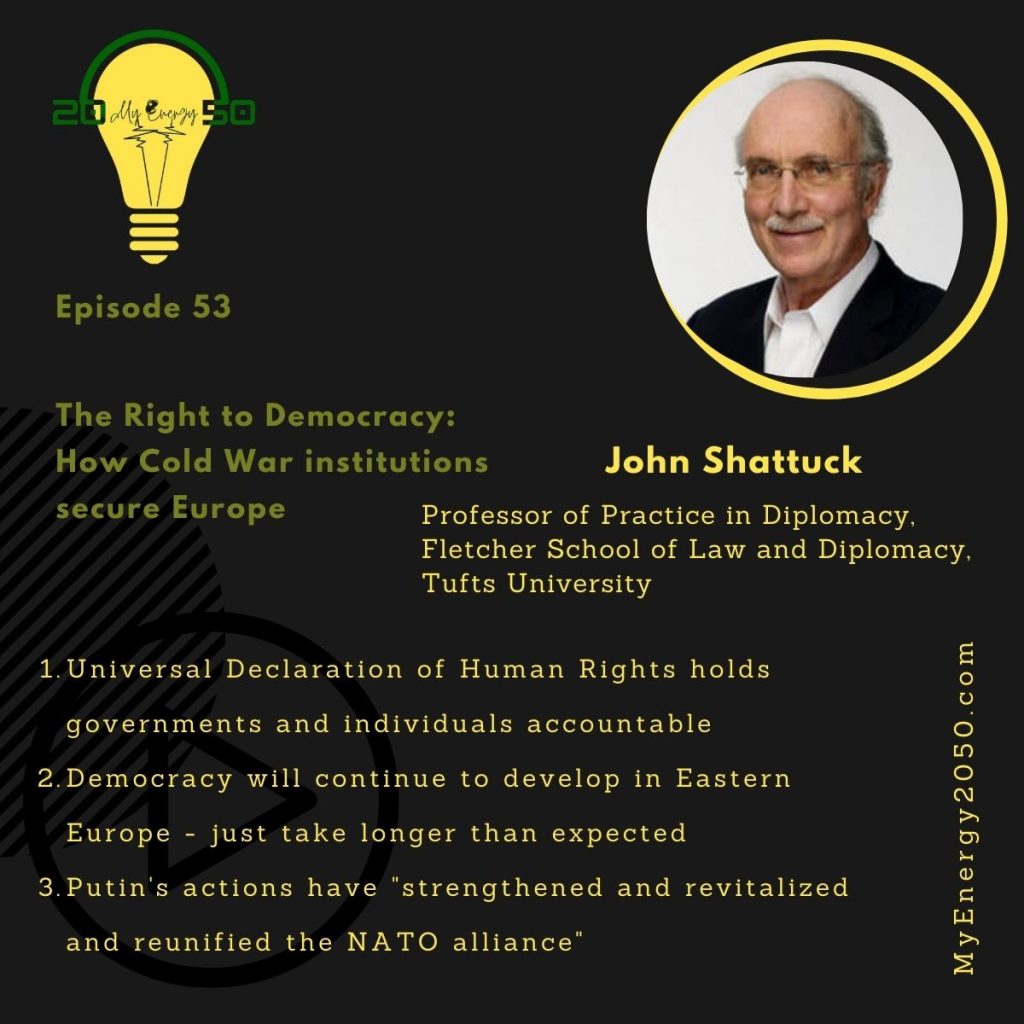This week we speak with John Shattuck, Professor of Practice in Diplomacy at the Fletcher School of Law and Diplomacy, at Tufts University. He is an international diplomat and scholar. From representing the United States in a variety of human rights roles, an ambassador to the Czech Republic, and president and rector of Central European University in Budapest, John has a steadfast adherence to human rights and holding positions that enable the United States and citizens of many countries to benefit from his dedication to public service.
When I thought about who to speak to concerning Russia’s threats to invade Ukraine, I thought of John. And to be honest, I don’t know how to frame the pressures on our current international order. These pressures, we can see and feel in high oil, electricity, and natural gas prices. But high energy prices are not the problem, there are deeper reasons for the high prices. And this is what I’m attempting to understand and why we are speaking about it on a podcast focused on energy.
I’ve described this in previous episodes as a ‘carbon storm’ where the cost of energy increases for periods of time because of instability in energy markets and political actions. The current conflict around Ukraine has taken on the form of military tension between the NATO alliance and Russia. But as we explore in this interview, there are other factors at play, such as the erosion of human rights, respect for democratic institutions, and the election of populists.
I’ve framed this interview in a broad macro perspective of what we can learn and understand from the Cold War. I think by understanding why we have the national and international institutions that we do, we can better enable these institutions to continue on with their founding missions. Because John was on the ground in Europe and the United States, both during and after the fall of Communism, we gain an informed perspective of the roots to the current international order, and the points of instability shaking the system now.

When we speak of the energy transition, it is often framed as a technological transition. The Cold War, was cold, because of the technology of nuclear arms. A direct war could not be fought because of the consequences. What we can learn about the politics and aspirations during and after the Cold War speak to the need to be aware that politics and social movements DO shape how people live and countries act.
John tells a story at the start of this interview and it wonderfully underscores this point. Listen to this and you’ll understand how John began a life of public service that protected and exposed failings in the respect for human rights. At the end of the interview, John also brings up the benefits of person-to-person interactions as creating and sustaining the seeds to respect and protection of peace. I think his role as president and rector of CEU, where he led the institution to educate thousands of international students, underscores just one part of his international legacy to the advancement of human rights.
Transcript
References:
Shattuck, John. “Democracy and Its Discontents.” The Fletcher Forum of World Affairs 40, no. 2 (2016): 173–84.
Shattuck, John, and Kathryn Sikkink. “Practice What You Preach: Global Human Rights Leadership Begins at Home.” Foreign Affairs 100 (2021): 150.
Shattuck, John, and J. Brian Atwood. “Defending Democracy: Why Democrats Trump Autocrats.” Foreign Affairs 77, no. 2 (1998): 167–70. https://doi.org/10.2307/20048857.
Dr. Michael LaBelle is an associate professor at Central European University in the Department of Environmental Sciences. He produces the My Energy 2050 podcast to change how we communicate and improve the energy transition.
